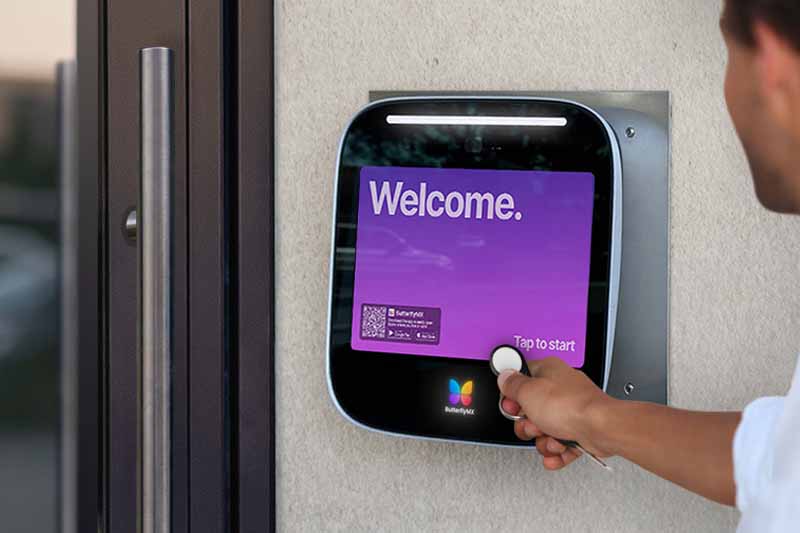Key takeaways
- Law firm physical security is the collection of security practices and hardware that you can use to secure your law firm’s office space.
- When you’re securing a law office, consider factors like employee safety, security measure redundancy, and emergency preparedness.
- Assess your physical security needs by performing risk analysis and keeping employees up-to-date on training.

Law firms have physical security needs that go beyond your average office space. You have to store highly sensitive information and documents while creating a secure environment for employees and clients alike.
Whether you’re managing a centralized office or a distributed workforce, ensuring your firm’s physical security is vital. In this post, we’ll go over why physical security matters for law firms and explain what you should look for in a law firm’s physical security system. Then, we’ll help you choose the right physical security system for your law office.
This post covers:
- Why does physical security matter for law firms?
- Key considerations for law firm physical security
- Assessing your firm’s physical security needs
- The right physical security system for your law office
- Law firm physical security FAQs
Why does physical security matter for law firms?
At its core, physical security for law firms refers to measures taken to protect both people and physical assets.
Property managers for all kinds of offices are used to maintaining a certain level of security. But for law firms, authorities like the American Bar Association and federal and state governments make it especially important to protect confidential client data.
And while ensuring the safety of employees, clients, and information is important, it’s also critical to ensure that property access is convenient and doesn’t impede the pace of your business.
A law firm’s security requirements include managing:
- Confidential documents. You should safeguard sensitive client files, evidence, contracts, and other proprietary materials from theft or unauthorized access.
- Valuable assets. Computers, servers, and mobile devices contain confidential data, and you should implement physical security measures as well as cybersecurity upgrades.
- Infrastructure. Dangers related to your building’s infrastructure include fire, water leaks, natural disasters, or break-ins.
Key considerations for law firm physical security
When considering physical security for your law firm, it’s essential to take a comprehensive approach. Every law firm has unique security needs depending on its size, location, structure, and the type of clients it serves.
Keep these security needs in mind when considering law firm physical security:
Watch how ButterflyMX works:
1. Securing the physical office space
Access control systems like smart locks, keypads, and intercoms manage who can enter the office, particularly in areas that house sensitive information. Additionally, card readers, biometric scanners, and security codes should be used to restrict access to specific floors or rooms.
Further, you can strategically place cameras throughout the office to monitor entrances, exits, and other critical areas. Security footage is crucial not only for protecting assets but also for ensuring accountability in the workplace.
In addition to alarm systems, reinforced doors, window locks, and other physical barriers can help to protect offices after hours, especially in high-crime areas.
2. Employee safety
An often overlooked component of physical security is ensuring employee safety from workplace violence or threats. Law firms, especially those that handle high-stakes cases, can sometimes become targets for aggressive individuals.
Measures that uphold law firm security include:
- Workplace threat policies. Establish clear policies that outline how employees should respond to threats, how to report suspicious behavior, and what to do in case of an emergency.
- Employee training. Provide training on how to handle potentially violent situations, such as de-escalation techniques or how to seek help in case of a security threat. Employees should feel empowered to report any concerns without fear of retaliation.
- Panic buttons or emergency alerts. Consider installing emergency panic buttons or setting up a protocol for quickly alerting security or law enforcement in the event of a violent incident.
3. Cybersecurity
While securing devices against digital threats is necessary, law firm data security also means that laptops, tablets, and other mobile devices must be stored securely. Encrypting work data and locking devices when not in use can protect against theft or unauthorized access.
Physical and cybersecurity also intersect in terms of electronic credentials. Wireless keys and fobs are convenient to use — but to prevent hackers and scammers from using RFID copiers to duplicate these credentials, you should ensure that any electronic credentials you hand out have high levels of encryption and anti-cloning upgrades.
4. Emergency preparedness
Emergencies such as natural disasters, fires, and accidents are always a possibility. Law firms should have plans in place to address potential emergencies, including:
- Evacuation plans. Clearly mark exit routes and have a detailed evacuation plan that employees can follow in case of an emergency.
- Fire safety. Install fire alarms, extinguishers, and emergency lighting in all offices, and conduct regular fire drills to ensure everyone knows what to do in case of a fire.
- Natural disaster protocols. Ensure that your firm has protocols in place for natural disasters like floods, hurricanes, or earthquakes, depending on your geographical location.
Assessing your firm’s physical security needs
As with any aspect of security, the first step to enhancing physical security is to assess your current needs and vulnerabilities.
A comprehensive physical security assessment should include:
- Risk analysis. Identify potential threats to your firm’s assets, employees, and data. Are you in a high-crime area? Does your firm handle sensitive, high-profile cases that may attract attention?
- Asset identification. Rank your firm’s assets—both physical and intellectual—by value, and create strategies for safeguarding them. This could include everything from physical documents to valuable office equipment.
- Employee safety. Evaluate the security measures in place to protect employees, particularly those working in remote or non-traditional workspaces.
- Alarm systems. Fire alarms, motion sensors, and break-in detection alarms should be standard in any office to prevent intrusions and other emergencies from going unnoticed.
Remote work and your law firm
With the rise of remote and hybrid work models, law firms are facing new physical security challenges. Employees are no longer working under the same roof, which can make monitoring and maintaining security more difficult. Even when employees work from home, the firm still has a responsibility to ensure they are operating in secure environments.
Two ways to increase security in a remote work environment include:
- Employee self-reporting. Encourage employees to report on their home office security practices. Do they lock doors and windows when working late? Are work devices secured when not in use? Encouraging a culture of “if you see something, say something” can help to minimize risks.
- Remote work tools. For employees who set up offices in non-traditional workspaces like coworking spaces, the firm should assess whether these environments are secure enough to house sensitive data. Devices like portable safes, password-protected devices, and encrypted cloud storage can help mitigate risk.

The right physical security system for your law office
Lawyers across the country trust ButterflyMX to manage access for employees and clients and safeguard sensitive documents and information. With our suite of Video Intercoms, Keypads, Card Readers, and more, we’ve made access simple for over 15,000 buildings.
And don’t just take our word for it — check out any of our over 40,000 five-star reviews to hear from our happy customers.
ButterflyMX features include:
- Hardware access options. We know that law offices can come in all shapes and sizes, from a few rooms rented in an office to their very own multistory building. Mix and match our hardware to suit your unique needs. Choose between different types of door credentials and manage access for other areas like parking lots and elevators.
- Increased security. Maintain security with our electronic log, which maintains an easily auditable record of door release events. Further, you can use our hardware to secure different entryways depending on the level of security you need for that area.
- Intuitive mobile app. Ensure your law firm’s physical security with our app. Allow employees to easily swipe to open the door and seamlessly manage access for clients, guests, and delivery couriers.
- Vehicle entry. Eliminate jams and increase convenience at your front gate with our Vehicle Controls. With our system of windshield stickers and automatic sensors, you can ensure that employees always have seamless vehicular access. Plus, make access easy for visitors with cars using our mobile app.
Law firm physical security FAQs
- What does physical security include?
- Is the cloud safe for law firms?
- What does law firm physical security cost?
What does physical security include?
Physical security includes hardware like locks, alarms, and keypads, as well as guidelines and practices that your staff can follow.
While physical security might bring to mind security against unwanted intruders, physical security measures are also important in other cases, like natural disaster preparedness and cybersecurity.
Is the cloud safe for law firms?
Yes, the cloud is safe for law firms. Without the cloud, a law firm has to manage its own cybersecurity — and that means spending thousands of dollars on installing and maintaining a server room.
On the other hand, cloud-based companies can spend all of their time and resources managing your cybersecurity, allowing you to focus entirely on your existing workload.
What does law firm physical security cost?
For a law firm, physical security hardware like keypads and card readers will cost around $500 to $3,000 per door.
In addition to upfront installation costs, you may also have to pay monthly maintenance and upkeep fees.






